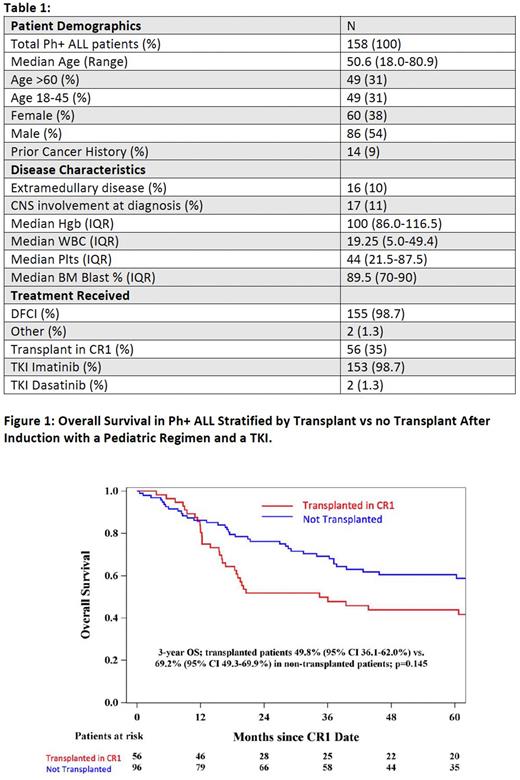Abstract
Introduction: Ph+ ALL has long been considered a high risk leukemia with poor outcomes when multi-agent chemotherapy is used alone. Allogeneic transplantation is considered by many the only chance of cure in this population. After reviewing data at Princess Margaret Cancer Centre (PMCC) in 2016, we found no overall survival (OS) difference between transplanted and non-transplanted Ph+ ALL patients. Thereafter, only relapsed or refractory patients were transplanted. We sought to determine the outcomes of non-transplanted Ph+ ALL patients who received a modified pediatric regimen (without asparaginase) with imatinib.
Methods: A retrospective chart review of Ph+ ALL treated at PMCC from 2001 to 2019 was undertaken. Patient demographic data, disease characteristics, response, and course, as well as treatment information, were collected and a descriptive summary was presented using counts/proportions and median/IQR or range as appropriate. OS/RFS rates were calculated using the Kaplan-Meier product-limit method, and the impact of covariates of interest were assessed using the Log-rank test.
Results: 158 Ph+ ALL patients were identified since 2001. 56 patients (35.4%) received a transplant in CR1, while 102 (64.6%) did not. All patients received a modified pediatric-inspired regimen typically with imatinib (Table 1). Median follow up was 38 months (range 1 to 229 months). 144/158 patients achieved a CR with first induction (91%). N=6 patients died during induction (3.8%). Overall survival for all patients at 3 and 4 years, was 61.8% (95% CI 53.4-69.1%) and 54.1% (95% CI 45.5-61.9%) respectively. Overall RFS at 3 and 4 years, was 51.7% (95% CI 43.3-59.4%) and 46.3% (95% CI 37.9-54.2%) respectively. When stratified by transplant in CR1, 3-year OS was 49.8% (95% CI 36.1-62.0%) in transplanted patients vs 69.2% (95% CI 49.3-69.9%) in non-transplanted patients; p=0.145 (Figure 1). There was no significant difference in RFS at 3 years in transplanted (46.4% [95% CI 33.0-58.7%]) vs non-transplanted (55% [95% CI 44.2-64.6%]) patients; p=0.89. A 6-month PCR level indicating a molecular 3 log (or deeper) reduction (MR3) in BCR-ABL1 transcripts predicted a statistically significant improved 3-year RFS of 71.4% (95% CI 40.6-88.2%) vs those who had achieved only an MR2 (25% [95% CI 0.9%-66.5%] p=0.037). Overall, 48 patients relapsed. Of these, 13 received blinatumomab +/- a tyrosine kinase inhibitor (TKI) after relapse and 12/13 (92.3%) achieved a second CR, including one patient who had relapsed post-transplant. Of the 12 who achieved a CR2, 5 went on to an allogeneic transplant.
Conclusion: Using a modified pediatric regimen and imatinib, there was no difference in overall survival between transplanted and non-transplanted Ph+ ALL patients, provided that they achieved an MR3 (or deeper) at 6 months. In those who were not transplanted in CR1 and subsequently relapsed, blinatumomab + TKI was a successful salvage regimen.
Disclosures
Schuh:GlycoMimetics: Consultancy, Membership on an entity's Board of Directors or advisory committees, Research Funding; Phebra: Consultancy, Membership on an entity's Board of Directors or advisory committees, Research Funding; Astellas: Membership on an entity's Board of Directors or advisory committees; Amgen: Membership on an entity's Board of Directors or advisory committees; Agios: Consultancy, Membership on an entity's Board of Directors or advisory committees, Research Funding; BMS: Membership on an entity's Board of Directors or advisory committees; Jazz Pharmaceuticals: Membership on an entity's Board of Directors or advisory committees; Novartis: Membership on an entity's Board of Directors or advisory committees; Pfizer: Membership on an entity's Board of Directors or advisory committees; Servier: Membership on an entity's Board of Directors or advisory committees; Teva Pharmaceutical Industries: Membership on an entity's Board of Directors or advisory committees; AbbVie: Membership on an entity's Board of Directors or advisory committees. Yee:F. Hoffmann La Roche: Consultancy, Research Funding; Bristol-Myers Squibb/Celgene: Consultancy; Shattuck Labs: Consultancy; Astex: Research Funding; Takeda: Consultancy; Novartis: Consultancy, Honoraria, Research Funding; Abbvie: Honoraria; TaiHo: Consultancy; Janssen: Research Funding; Treadwell: Research Funding; Forma Therapeutics: Research Funding; Geron: Research Funding; Gilead: Research Funding; Karyopharm: Research Funding; Jazz: Consultancy, Research Funding; GlaxoSmithKline: Consultancy; Pfizer: Consultancy; Astellas: Consultancy. Schimmer:Novartis: Consultancy, Honoraria; Astra Zeneca: Consultancy, Honoraria; Takeda Pharmaceuticals: Consultancy, Honoraria, Research Funding; Otsuka Pharmaceuticals: Consultancy, Honoraria; Jazz: Consultancy, Honoraria; BMS: Consultancy, Honoraria, Research Funding; Medivir AB: Research Funding; UHN: Patents & Royalties: the use of DNT cells to treat AML. Gupta:Novartis: Consultancy, Honoraria; Constellation Pharmaceuticals, Inc., a MorphoSys Company: Consultancy, Honoraria; Pfizer: Consultancy, Other: Participation on a Data Safety or Advisory board; Sierra Oncology: Consultancy; Roche: Other: Participation on a Data Safety or Advisory board; AbbVie: Consultancy, Other: Participation on a Data Safety or Advisory board; BMS Celgene: Consultancy, Honoraria, Other: Participation on a Data Safety or Advisory board. Kim:Paladin: Consultancy, Honoraria, Research Funding; BMS: Research Funding; Pfizer: Consultancy, Honoraria, Research Funding; Novartis: Consultancy, Honoraria, Research Funding; Merck: Consultancy; Sanof: Consultancy, Honoraria.
Author notes
Asterisk with author names denotes non-ASH members.


This feature is available to Subscribers Only
Sign In or Create an Account Close Modal